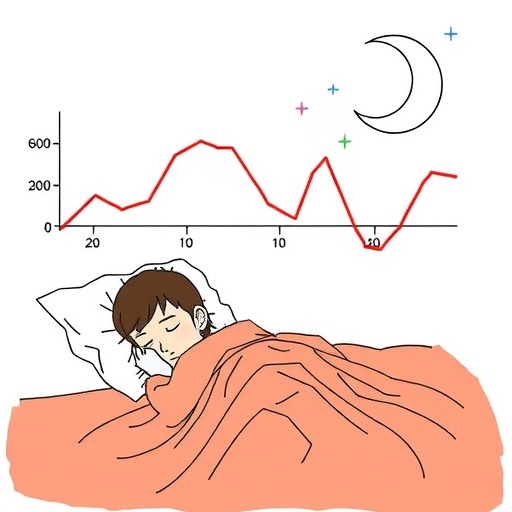In a groundbreaking new study published in BMC Psychiatry, researchers have delved deep into the intricate relationships connecting sleep duration, depressive symptoms, and overall mortality risk. Drawing from robust data collected in the National Health and Nutrition Examination Survey (NHANES) between 2011 and 2014, this research unpacks how both objective and subjective sleep times differentially influence life expectancy through the lens of mental health. The findings illuminate the complexities of how our perception—and reality—of sleep intertwine with depression, ultimately impacting survival.
Sleep has long been recognized as a pillar of human health, with its deprivation linked to a host of adverse outcomes ranging from cognitive decline to cardiovascular disease. However, while many studies focus on sleep quantity or quality in isolation, this new investigation pioneers a comparative approach between objective (measured via devices or clinical assessments) and subjective (self-reported) sleep durations. Such dual consideration allows for a nuanced understanding of how the lived experience of sleep, as well as its actual measurement, play individual roles in health trajectories.
At the heart of the study is the concept that depressive symptoms might serve as a critical mediator bridging the gap between sleep duration and mortality. The researchers employed the Patient Health Questionnaire-9 (PHQ-9), a validated screening tool for depression, to quantify depressive symptom severity among 7,838 adults, whose ages averaged approximately 46.5 years. This sizable cohort was followed for nearly seven years, allowing for comprehensive monitoring of all-cause mortality events.
The statistical approach utilized—structural equation modeling (SEM)—offers powerful insights by delineating both direct and indirect pathways of influence. This analytic framework reveals not merely correlations but potential mechanisms, showing how depressive symptoms might transmit the effects of sleep patterns onto mortality risk. Crucially, the study mapped distinct curves describing these relationships: a J-shaped pattern for objectively measured sleep and mortality risk and a U-shaped curve for self-reported sleep duration.
These shapes signal multifaceted risks. The J-shaped curve suggests that both very short and very long objective sleep durations associate with elevated mortality, with an optimal midpoint offering the lowest risk. Meanwhile, the U-shaped curve for subjective sleep duration indicates that people’s perception of either too little or too much sleep can also elevate mortality risk, perhaps reflecting underlying health conditions or mood disorders altering self-assessment.
One of the most striking findings concerns the role of depressive symptoms in mediating mortality risk linked to shorter subjective sleep duration. The data reveal that when individuals reported sleeping less than seven hours per night, depressive symptoms accounted for an astonishing 40.63% of the effect on mortality risk. This powerful mediation underscores the profound psychological dimensions entwined with sleep perception and health outcomes.
Conversely, when objective sleep duration measured seven hours or more, depressive symptoms exerted a much smaller mediatory role, accounting for only 2.10% of the pathway to mortality. This differential highlights the greater relevance of mental health in how individuals interpret and report their sleep, as opposed to how sleep is measured externally.
The implications of these findings reach far beyond academic interest. They emphasize the necessity to consider both subjective experiences and objective metrics in clinical assessments of sleep health. Particularly, the nexus between subjective sleep deprivation and depression should draw heightened attention in both psychiatric and primary care settings, where integrated approaches might better identify individuals at heightened risk of premature mortality.
Furthermore, the research compels a broader re-evaluation of public health messaging surrounding sleep. Statements focusing purely on “sleep duration” might fail to capture the underlying psychological distress that often accompanies poor sleep perception. Tailoring interventions that address not only sleep hygiene but also depressive symptoms could pave the way for more effective mortality risk reduction strategies.
The study’s longitudinal design and comprehensive sample lend credence to its conclusions, though questions remain about causality and potential confounding factors. Nevertheless, it sets a new standard in the field by bridging epidemiological data with nuanced psychological assessment, thereby painting a more complete picture of how intertwined bodily and mental health dimensions affect longevity.
Importantly, while objective measures of sleep may offer a gold standard for sleep assessment, the study reminds us not to dismiss the subjective experience. After all, how individuals feel about their sleep can shape behaviors, mood, and ultimately health outcomes in ways rigid metrics do not fully capture.
Further research expanding on these findings could explore targeted interventions that simultaneously improve sleep quality, address depressive symptoms, and monitor both subjective and objective sleep indicators. Such multidimensional strategies could revolutionize sleep medicine and mental healthcare alike, transforming mortality risk landscapes for millions worldwide.
As science continues to uncover the hidden pathways between sleep, mind, and mortality, this study reinforces the timeless advice: a good night’s sleep is as much about mental well-being as it is about the hours spent in bed. The new evidence advocates for an integrated approach where sleep quantity, quality, and psychological health coalesce as inseparable components of a healthy life.
This pioneering work opens a doorway toward precision medicine in sleep health, suggesting that personalized assessments incorporating mood evaluations alongside sleep measurements offer the most promising avenue for reducing premature death. By acknowledging and addressing the subjective meanings of sleep alongside quantitative measures, healthcare providers might better support those caught in the deadly crossroads of sleep deprivation and depression.
In essence, the study by Zeng, Liu, Qiu, and colleagues charts a critical map linking the nuances of sleep perception and reality to the stark reality of mortality risk—highlighting both the biological and psychological frontiers of health science in the 21st century.
Subject of Research: The interrelationship among objective and subjective sleep duration, depressive symptoms, and all-cause mortality.
Article Title: Association among objective and subjective sleep duration, depressive symptoms and all-cause mortality: the pathways study.
Article References:
Zeng, Y., Liu, T., Qiu, R. et al. Association among objective and subjective sleep duration, depressive symptoms and all-cause mortality: the pathways study. BMC Psychiatry 25, 735 (2025). https://doi.org/10.1186/s12888-025-07181-9
Image Credits: AI Generated




